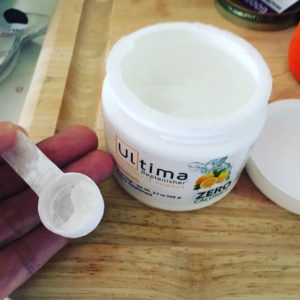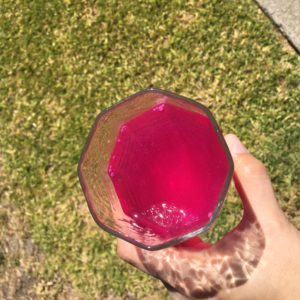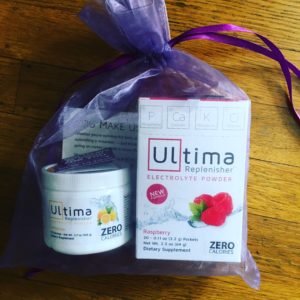Disclosure: I received raspberry Ultima sticks and a lemonade Ultima canister because I am a BibRave Pro. Learn more about becoming a BibRave Pro, and check out BibRave.com to review find and write race reviews. It’s a great way to help race directors see what is working and what needs improvement, and to help other runners find out what a race is really like. All opinions are my own.
Spread the word! You can save 35% and get free shipping on Ultima with code BIBRAVE2016Click To TweetIt’s summer, which means I need to up my hydration game. (Sadly, wine doesn’t count.) That’s part of why I asked to be one of the BibRave Pro Team members to test the new and improved formula of Ultima; I’m always looking for variety in my hydration game. Ultima sent me a 30-serving container of lemonade, as well as a box of raspberry individual stick-style packets. Ultima is a hydrating electrolyte beverage, NOT a fuel product. There are no carbs, proteins, or fats in Ultima (and therefore nothing for your body to use as fuel). Ever since I learned you can separate hydration from fuel, I’ve been a huge fan of taking that approach. First, since I sweat a lot (especially in the heat!) I need hydration more often than I need fuel. Second, separating hydration and fuel allows me to fuel with real foods and fat-containing foods, such as peanut butter. Third, the science is with me on this one: gastric emptying (stuff leaving your stomach and getting into the other parts of your body) is slowed by the addition of carbohydrates. (See resources below.)
First Thing’s First: How Does It Taste?
Flavor: Raspberry. If you’re like me, you need your hydration (and nutrition) to taste good. I can’t count the number of people who don’t drink enough water because “the water where I live tastes bad” (or some variation of that excuse). There are plenty of hydration options I don’t like because they are too sweet, too sour, too salty, taste like old socks, etc. To me, the raspberry flavor smells like a red popsicle. It has a pleasant taste that I like enough to both look forward to drinking while out running, and to drink at my desk to encourage me to stay hydrated. While it is sweetened in part with stevia, I had to try very hard to taste the stevia. At least one of the BibRave Pro team members (Heather from Heather Runs Thirteen Point One) loathes stevia and gave up on her prior hydration when the stevia flavor in the new formula got to be too much for her. (Note: I do not have this problem. I also like cilantro. That said, I’m sympathetic to those who have the genetic disposition that makes cilantro taste like soap. Perhaps there is a similar thing for stevia?)

Flavor: Lemonade. Since the raspberry Ultima I received came in sticks, it was easy to measure. (Cut one open, dump it in the glass, boom.) My lemonade Ultima came in a tub. By the way, I LOVE this. Thirty servings fit in the palm of my hand! This is a bonus to me because it means Ultima doesn’t hog a lot of pantry space and is travel-friendly. Of course a smaller package is also more environmentally-friendly (e.g. uses less plastic in the packaging, takes less fuel to transport, etc.) and a bulk package is less expensive than individually wrapped sticks (cost is about $0.66 per serving instead of $1 per serving). If you buy the larger canister (90 servings) the cost goes down to around $0.33 per serving. Anyway, when I first pulled out the teeny-tiny scoop I thought for sure it was too small to be the actual serving size, and mixed a heaping scoop with water. Bad move! It tasted like a non-gritty Country Time Lemonade mix! WAY too sweet! When I actually used the scoop to measure a level scoop–the real serving, and it seems tiny–it came out much better. The taste is lemonade, but a sweetish lemonade, not a sour/tart one. It’s not overly sugary, and I bet it would make a nice margarita when mixed with tequila.
Other flavors. Ultima also comes in orange, grape, cherry pomegranate, and “toddler berry punch” (which as the name implies, is intended for kids–a useful thing to have in your arsenal when your kid is getting dehydrated due to vomiting and diarrhea, for example). I’m using the BibRave discount to buy a big tub of cherry pomegranate the instant it comes back in stock.

Mouth-feel. I hate gritty drink mixes. Many powdered drink mixes seem to not fully dissolve, leaving little sand-like particles floating around in the drink (and this makes me crazy). Initially I was afraid that might be the case for Ultima, but it turns out I was just being silly–like most powders, if you mix Ultima in ice water it isn’t going to dissolve very well. Oops. When I tried very cold water (from a pitcher that had been refrigerated overnight), I put the Ultima in the bottom and poured the water over the top. This time, some powder rose to the top almost like bubbles. A quick swish with a spoon and they were gone. The resulting beverage was translucent pink, and smooth like water. The very bottom of the glass had a small amount of undissolved solids, but that didn’t bother me (though the very last sip had a tiny bit of a granular texture, it wasn’t sandy, and overall didn’t bother me–plus when I’m running I almost never get all the way to the bottom of the bottle before I refill).
What is NOT in Ultima?
Ultima’s website and packaging spend quite a bit of space on what is NOT in Ultima. Since that may also be important to you, here’s a list:
- No sugar
- No calories
- No artificial flavors
- No artificial colors
- No GMO ingredients (Non-GMO Project verified)
- No gluten (certified gluten-free)
- No animal products (certified vegan)
- No caffeine
- No added maltodextrin (the natural flavors have a tiny amount)

What is actually IN Ultima? A bunch of things.
You probably know you lose “salt” when you sweat, especially if you are a salty sweat-er (you can feel the grit on your face when you are done). Many people rely on salt packets when they run, but this is a mistake (outside the scope of this article, read the science-y bits of the article cited below). The short story is that you need to replenish ALL of the electrolytes you lose through sweat. (Did you know you sweat out iron too, especially in hot weather? That’s also a blog post for another day.)
Since many of the ingredients are familiar to the average person as “something from the periodic table” or “a chemical,” I thought it might be helpful to understand what each of these ingredients does inside the body–yes, every one of the main ingredients in Ultima already exists inside your body AND is critical for it to function at peak performance. I’ve included a quickie description, but also a link to that nutrient’s page on the Precision Nutrition Encyclopedia of Food. That way you can read more about food sources for that nutrient, as well as more than the examples I’ve given of problems that a deficiency may cause, and find out where that item lives in your food/diet.
The name in parenthesis is the form found in Ultima. (That way if you are as nerdy as I am, you can use your Google-fu for more information, and compare the bioavailability of various forms.) Potassium, for example, can combine to form many chemical compounds including potassium chloride, a common substitute for regular table salt (sodium chloride). In selecting the forms to include in Ultima, the creators tried to use the form that your body can most easily access and use (known as the most “bioavailable” form).
- Potassium (potassium aspartate)
- Essential mineral
- Electrolyte
- Assists in keeping the proper electrochemical gradient across cell membranes; this is important for nerve impulse transmission, cardiac function, and muscle contraction. The proper electrochemical gradient allows nutrients into the cell and waste products to exit. Deficiency can cause cardiac problems and muscle cramps. Read more.
- Magnesium (Magnesium citrate and Magnesium aspartate)
- Essential mineral
- Electrolyte
- Helps your body metabolize fats and carbohydrates, involved in DNA and protein synthesis, plays a role in wound healing. Deficiency can cause hypokalemia (deficiency of potassium in the bloodstream). Read more.
- Chloride (sodium chloride)
- Essential mineral
- Electrolyte
- Like Potassium, assists in keeping the proper electrochemical gradient across cell membranes (see above); also aids in the digestion and absorption of many nutrients. Deficiency can cause low blood pressure and weakness. Read more.
- Calcium (calcium citrate and calcium ascorbate)
- Essential mineral, and the most common mineral in the body
- Electrolyte
- We all know it plays a role in healthy bones and teeth, but did you know it also regulates nerve impulse transmissions, muscle contractions, and hormone secretions? Deficiency can cause skeletal problems (e.g. rickets, osteoporosis), among others. Read more.
- Selenium (amino acid chelate)
- Essential mineral
- Helps create antioxidant balance in the body, works in concert with certain proteins and enzymes. Deficiency can lead to problems with cartilage development/formation, among other problems. Read more.
- Zinc
- Essential mineral
- Helps with growth, development, neurological function, reproduction, and immune function (that’s a lot of different things!); acts as a catalyst in some chemical reactions within the body; forms/sustains cell structure; regulates genetic expressions, signaling among cells (including in the nervous system), and release of hormones. A zinc deficiency can slow wound healing. Read more.
- Phosphorus (potassium phosphate)
- Essential mineral
- Yes, this is the stuff on match tips (but please don’t go eat them!). It forms bone structure, plays a role in energy transfer, helps with hormone production and enzyme production, signals cells, and facilitates binding site activity for hemoglobin. Deficiency is pretty rare. Read more.
- Sodium (sodium chloride)
- Essential mineral
- Electrolyte
- Often painted as the dietary bad-guy, sodium is something you lose through sweat, and replacing it is important! Like Potassium, Sodium assists in keeping the proper electrochemical gradient across cell membranes. It also regulates extracellular fluid (fluid outside of your cells) and is key to blood volume and blood pressure. A sodium deficiency spells race day disaster: nausea, vomiting, disorientation/confusion, cramps, headache, and fatigue. Read more.
- Copper (copper citrate)
- Essential mineral
- Pennies might not be made of it anymore, but copper does help make up some neurotransmitters and the myelin structures that coat your nerves. (No copper? Nervous breakdown, ha ha!) Copper helps with collagen and elastin structures, and helps with protein synthesis and cell energy. Deficiency can cause anemia that doesn’t respond to iron treatments, and cause imbalances/deficiencies in your white blood cells. Read more.
- Manganese (manganese citrate)
- Essential Mineral
- Electrolyte
- Tiny but mighty? That’s manganese. It helps metabolize carbs, cholesterol, and amino acids (the building blocks of protein); it helps the antioxidant enzymes of the mitochondria (the “powerhouse” organelles inside your cells). Deficiency is rare. Read more.
- Molybdenum (sodium molybdate)
- Essential Mineral
- Acts as a cofactor (a substance required for enzymes to do their jobs) for the enzymes in the carbon, nitrogen, and sulfur cycles; also helps with metabolism of drugs. Read more.
- Chromium (chromium dinicotinate glycinate)
- Essential Mineral
- Enhances the effects of insulin and assists in metabolism of glucose and fat. Deficiency (predictably!) can cause impaired glucose tolerance and elevated circulating insulin. Read more.
There are some additional ingredients that vary by flavor (for example, beta carotene exists naturally in oranges, so it is present in orange flavor). You can read Ultima’s description of their ingredients on their website.
That’s The Basics. You’ve probably now learned more than you ever needed or wanted to know about Ultima, but in case you need more, do go to the website: http://www.ultimareplenisher.com/ The website can tell you where to find Ultima in stores near you, but the code BIBRAVE2016 which gets you 35% off plus free shipping will only work on the Ultima website.
Selected References:
- Maughan, RJ. “Fluid and electrolyte loss and replacement in exercise.” J Sports Sci. 1991 Summer;9 Spec No:117-42.
- Steve Born (for Hammer Nutrition). “Electrolyte Replenishment: Why It’s So Important and How to Do It Right.”
- Waller, MF and Haymes, EM. “The effects of heat and exercise on sweat iron loss.” Med Sci Sports Exerc. 1996 Feb;28(2):197-203. Find the abstract on PubMed.